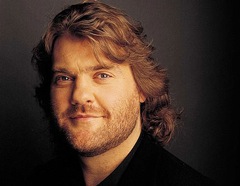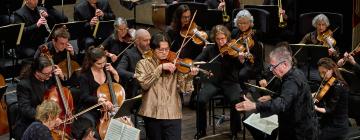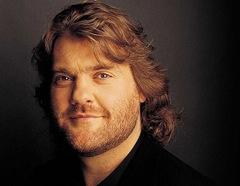It’s probably a good thing that Bryn Terfel stopped singing at the end of his recital Saturday night at Zellerbach Hall. Had he kept going, the audience would still be there, cheering for more.

Terfel isn’t simply one of the best singers before the public today. He’s also the most magnetic. At Saturday’s performance, presented by Cal Performances and accompanied by the superb pianist Malcolm Martineau, the Welsh bass-baritone gave a sort of master class on how to hold an audience in thrall.
By now, Bay Area aficionados have gotten the message about Terfel, who made his Cal Performances debut in 1996 and has sung select roles at San Francisco Opera, including a robust turn in the title role of Mozart’s Le nozze di Figaro, and a saturnine Nick Shadow in Stravinsky’s The Rake’s Progress. In each appearance, his gifts — a magnificently large, resonant voice; keen musical intelligence; uncommon theatrical flair — made a lasting impression.
Still, as evidenced by his Berkeley recital, Terfel just keeps getting better. This is an artist who has charted his own path: making wise decisions concerning his health and choice of repertoire, refining his interpretations, and giving 100 percent in every performance.
In his case, 100 percent approaches the superhuman. To hear Terfel in recital is to marvel at the size, heft, dynamic range, and sheer beauty of his voice. It seems almost unfair for one singer to possess so many outstanding qualities and be so charismatic, too.
The charisma factor was apparent throughout Saturday’s program, which opened with Robert Schumann’s “Belsatzar,” “Liederkreis,” “The Two Grenadiers,” and “My Carriage Rolls Slowly”; continued after intermission with Gerald Finzi’s “Let Us Garlands Bring” and Jacques Ibert’s “Four Songs of Don Quixote”; and concluded with a tribute to the baritone John Charles Thomas.
Terfel engaged the audience from the opening phrases of “Belsatzar.” Schumann’s setting, which incorporates Heinrich Heine’s narrative of Belshazzar’s biblical feast, is dramatic by any measure, but Terfel turned it into a gripping tour de force. Despite rumors to the contrary, the singer’s recent assignment as Wotan in the Metropolitan Opera’s Rheingold appears to have left him with greater vocal strength than ever.
“Liederkreis” revealed Terfel at the height of his powers, covering the wide emotional terrain of these miniature settings in a subtly nuanced, emotionally transparent performance. Each song was a tiny drama: Terfel’s gorgeously floated tone in “Mondnacht” (Moonlit night) seemed to stop time; “Wehmut” (Sadness), with Martineau playing with sensitivity and refinement, came across with exquisite directness.
Terfel’s artful phrasing and sheer vocal power can summon imagery with an almost cinematic impact. The first half ended with the singer at his most expansive. In “The Two Grenadiers,” the tale of defeated French soldiers has seldom seemed so fraught with shame and bitterness. And in “My Carriage Rolls Slowly,” Terfel evoked a vivid scene, then made an amusingly theatrical exit even as Martineau was finishing Schumann’s extended postlude.
Renditions Range From Stunning to Elegant
Terfel has always been at home in the Finzi songs — he recorded them over a decade ago — and he returned to them here in a reading of stunning depth and potency. “Fear No More the Heat o’ the Sun,” the cycle’s high point, emerged as a haunting meditation on mortality.
So, in a different way, did Ibert’s “Don Quixote” songs, which Terfel delivered with a deft blend of elegance and swagger, firm projection, and excellent French. The final “Chanson de la Mort,” shaded beautifully by Martineau, was especially affecting.
The program ended with the tribute to John Charles Thomas, an American singer of Welsh descent who rose to international fame before World War II. He’s slipped from public view in recent years, but Terfel aims to raise his profile again; part of the reason, he explained, is familial — “My grandfather loved him,” he said — and part of it is Terfel’s affinity for Thomas’ repertoire. In between anecdotes about the singer, Terfel sang some of that repertoire: “Trees,” the Oscar Rasbach setting of Joyce Kilmer’s poem; the folk song “All Through the Night” (sung in Welsh); Gilbert and Sullivan’s delightfully grisly “When the Night Wind Howls” from the G&S operetta Ruddigore; and Albert Hay Malotte’s setting of “The Lord’s Prayer.” Starting “Home on the Range” as a sing-along — “You sound better than the Carnegie Hall audience,” he quipped — Terfel infused the familiar tune with such an atmosphere of yearning that the audience fell into enraptured silence; as the last notes died, you could have heard a pin drop.
Then came the encores: “Trade Winds,” “The Green-Eyed Dragon With the Thirteen Tails,” and “Tally Ho!" With that, Terfel left the stage, though no one wanted him to go.

